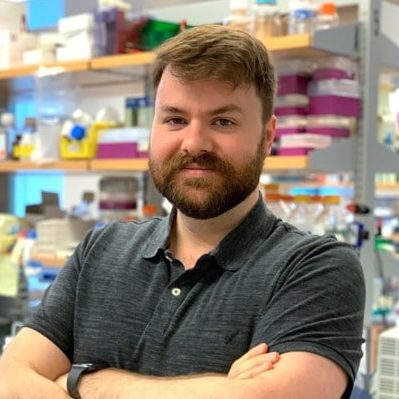Augmenting Melanoma Response to Immunotherapy via Commensal Microbiota
Matthew Griffin, PhD
| Mentor | Howard Hang, PhD |
|---|---|
| Award Type | Career Development Award |
| Institution | Rockefeller University |

Cancer immunotherapy (CI) drugs activate our own immune system to directly kill cancer cells. These drugs have revolutionized how we treat many cancers including melanoma. However, not all patients respond equally to CI treatment, and we still do not fully understand why. Surprisingly, microorganisms in our gastrointestinal tract known collectively as the gut microbiota may be necessary for effective CI treatment. Melanoma, lung, and kidney cancer patients who responded to CI drugs contained a higher abundance of specific bacteria including Enterococci species compared to non-responding patients. These results suggest that individual bacterial species in the gut may improve CI therapy. Nevertheless, how this occurs is still unclear. In parallel, our laboratory has found that one Enterococcus species, Enterococcus faecium (Efm), can protect against infection by activating the immune system. Efm produces SagA, an enzyme that breaks down the bacterial cell wall to produce small molecules that stimulate innate immunity via the sensor Nod2. Based on these results, I hypothesize that Enterococcus species can also improve CI drug effectiveness through the direct activation of host immunity via a similar mechanism. To test this, I will first examine how colonization of the GI tract with Enterococci can directly change the growth of melanoma in mice and alter immune cell activation within the tumor during CI treatment. To decipher how Enterococci can alter drug response, I will then test whether the SagA enzyme and the resulting small molecule it produces are sufficient to improve CI drug effectiveness against melanoma. Finally, I will determine whether Enterococci-mediated melanoma suppression also requires the host sensor Nod2. Together, these experiments will provide direct evidence for how individual species of commensal bacteria can activate the host immune system during immunotherapy treatment of melanoma. Results from this proposal may allow us to predict how well patients will respond to CI drugs by detecting the presence of SagA-expressing Enterococci bacteria in their GI tract. Moreover, the microbial and host components I identify may provide new ways to improve clinically approved CI drugs via new probiotic or small molecule combination therapies.

